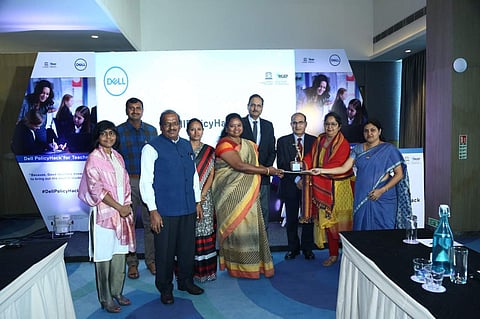

It can't be argued that technology has become ingrained in our lives, especially after the world was forced to go online post-COVID. While it was easy for some, others found it very difficult to make the transition from offline to online. Among them are the teachers, especially those in Tier 2 or Tier 3 cities and towns. Much before the pandemic, Dell Technologies launched a unique initiative called Aarambh to train such teachers. Through this programme, teachers were trained in technology, especially the Personal Computer (PC) to enable them to teach students better. Dell Aarambh was started in 2016 and continues to train teachers across India.
In a study conducted over the last two years, which sampled a total of 435 teachers, Dell found that the training has managed to improve the tech proficiency among teachers so much so that they went back and taught what they learned to their colleagues. It not only helped them understand the workings of a computer better but also helped them make the classes more interesting and effective. We spoke to Ritu Gupta, Marketing Director at Dell to know more about the programme and what the study inferred.
According to the Dell Aarambh survey, PC proficiency is significantly lower in the Eastern and Western regions. Is Dell doing anything to improve the numbers?
As per the findings of this research, trained teachers from Southern (98 per cent) and Northern parts (82 per cent) of India showed better proficiency as compared to teachers from East (43 per cent) and West (56 per cent). Overall, four out of 10 teachers who had attended the training became an independent user of a computer, which was not the case before. This showcases a shift in the perception and the confidence amongst our trained teachers, many of whom addressed their ‘fear’ of technology.
PC proficiency also decreases with age as seen in the survey. Is there a way out of this?
There is a noticeable lack of confidence among senior computer users and that translates into their ability to become proficient with computer technology. Schools have shown interest to train teachers across subjects and all age groups and encourage teachers. However, we also saw that senior teachers were turning to younger teachers for support on picking up computer skills.
Was it difficult to shift training programmes online?
With Aarambh’s growing acceptance among teachers, students and their parents, we were clear on pivoting the programme from offline to online. It had its initial challenges but every month we saw an increase in attendance of webinars. For these webinars, we roped in skilled educators to help with the basic and advanced training modules. The course content focused on the preparation required by teachers and schools to make the significant switch from classroom teaching to online teaching, tips and tricks for making the online classroom more effective and the tools teachers can use to make the learning easier for the students. At the time of the research, results reflected that 8 out of 10 teachers were comfortable with online training and so far we’ve trained 10,398 teachers online. Transitioning online allowed us to expand our reach to newer cities and schools. We were able to engage and train teachers from varied backgrounds.
In a year when online classes and technology became inevitable, how do you think the digital divide can be addressed?
What most of us have realised this year is that the PC has emerged as the single go-to tech and tool for us. For teachers, parents and students it is a way to engage in education, learn, explore, stay entertained, communicate and work. A strong foundation in the use of technology can aid a holistic learning process, ensuring that each student is able to use it to adapt their individual learning capability. Post receiving the training, the teachers observed 100 per cent attendance whenever smart classes were used whereas the perception of computers playing a positive role in teaching is tremendously high at 85 per cent. Around 90 per cent of the teachers also felt that computers create a positive impact on a student's learning curve. In addition, the government’s steady focus on progress towards a digital future for its citizens with the Digital India programme and emphasis on skill-building are shaping an ecosystem that can foster the seamless inclusion of technology in education.
The study also noted that there has been an increased interest among students and teachers post the training. What does it say about the need for computer education?
Digital literacy is paramount for job seekers and job providers and most importantly for the future workforce – the students. As per the study, 70 per cent of Aarambh trained teachers stated that computers enable them to give more “demonstrative”, “interactive” examples to students and 65 per cent said it helps students in understanding concepts easily. In smaller cities as well, 96 per cent of the Aarambh trained teachers have opined that the significance of computers had increased in their daily lives after the training as compared to untrained teachers.
According to the study, only 60 per cent of the teachers went ahead and taught computers to others. What can be done to improve these numbers?
We aim to train more teachers to take their teaching sessions to the next level with the use of interactive engagement tools. The Aarambh training programme has made teachers and principals, open to embracing and adopting computer technology encouraging the “each one teach many/each one teach one” model thus helping and benefitting co-workers to further upskill themselves making the initiative successfully self-sustainable and scalable.
